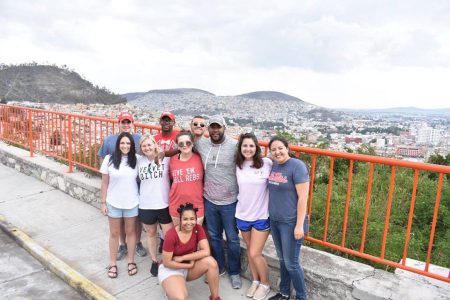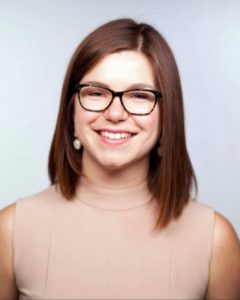Public Policy Leadership
What does it mean to major in public policy leadership?
Public policy leadership, the only interdisciplinary undergraduate program of its kind among SEC schools, is a study of public policy and leadership that prepares high-performing students for positions of leadership in an increasingly complex world.
Turning ideas into action is the focus of the public policy leadership major. Students combine the study of public policy with the study of the leadership qualities necessary to plan and implement successful policy. The interdisciplinary curriculum incorporates economics, geography, philosophy, political science, public administration, and policy.
PPL majors gain a broad knowledge of public policy and skills in policy analysis, organizational leadership, social science research, critical thinking, written communication, oral communication, consensus building, and decision-making. Students acquire an understanding of the ethical imperatives of leadership, and a clear appreciation of the global nature of responsible decision-making.
The fact sheet provides a summary of the major, information about the program, and our alumni. The degree sheet gives the specific requirements and a sample 4-year curriculum plan.
Minor in public policy leadership?
To minor in public policy leadership, a current UM student must have at least a 3.0 GPA, complete an application, and meet with the department chair.
A minor in public policy leadership consists of six public policy leadership courses, including PPL 101, and at least one class at the 300 level or above in each of the following three categories: leadership/organization, domestic policies, and international policies.
Why is UM a good place to major in public policy leadership?
The faculty of this interdisciplinary department have Ph.D. degrees ranging from political science, geography, public administration and policy, and philosophy. Their areas of strength include civic engagement, information technology in public administration, ethics, regional development, environmental policy, economic policy, food policy, non-profit organization, social policies, and moral responsibility.
In partnership with the Trent Lott Leadership Institute, the department offers enriching experiences to students through interactions with policy makers/practitioners, summer study abroad, and internships. The Washington Internship Experience allows students to live, work, and study in our nation’s capital for a semester. Summer Lott/PPL study abroad experiences have included Argentina, Czech Republic, Israel, China, Mexico, South Africa, and South Korea. Students pursue internships in government (White House, U.S Congress, Supreme Court, State Legislatures, and local governments) and in areas such as finance, technology, medicine, education, politics, media affairs, non-profits, science, and law enforcement.
The Lott Leadership Institute offers scholarships to entering freshmen with exceptional leadership and academic records who will pursue a B.A. degree in Public Policy Leadership. The scholarships provide $10,000 per year for four years.
What can public policy leadership majors do after graduation?
A liberal arts education empowers and prepares students to deal with complexity and change through a broad knowledge of the world. They gain key skills in communication, problem-solving, and working with a diverse group of people. Related careers to public policy leadership include government, law, policy analyst, natural resource manager, legislative researcher, nonprofit and NGO administrator, or project development analyst and manager.
The PPL alumni work in many different sectors of the economy, with the top six shown in the infographic to the right. The group is working in government, particularly Capital Hill. The second largest group is community services and non-profits, particularly national offices of non-profit organizations.
Alumna Profile
Christine Dickason (BA in PPL ’15)
 “I grew up in an active political family, but my focus shifted to policy when I volunteered as an ACT tutor in Memphis public schools. I attended school 30 minutes away, but saw drastic differences in educational quality and access. It made me question the wide educational gaps.”
“I grew up in an active political family, but my focus shifted to policy when I volunteered as an ACT tutor in Memphis public schools. I attended school 30 minutes away, but saw drastic differences in educational quality and access. It made me question the wide educational gaps.”
Dickason was a founding member of the UM Food Bank and a leader with the Associated Student Body, Ole Miss College Democrats, and Mississippi First. She presented her ideas about education at a national conference and her honors thesis included a documentary film on college preparation and student aspirations in MS public high schools. Dickason was also a Truman Scholarship finalist.
After graduation Dickason served as former First Lady Michelle Obama’s Deputy Director of Correspondence until the end of the Obama administration. “It was in a once-in-a-lifetime experience that I never expected, but it taught me so much—from how the highest levels of the federal government operates to how to help plan an entire trip to Yosemite National Park for the First Family. Most importantly, it taught me to be flexible with my plans and stay open to incredible opportunities.”
While earning her MA in Public Policy at George Washington University, Dickason has worked at the Government Accountability Office, the Center for American Progress, and now, the Global Development Incubator. She is currently pursuing her PhD in the Department of Leadership, Policy, and Organizations at Vanderbilt University where she studies school counselors and their role in shaping our country’s schools. She also serves as the Communications Director + Associate Director for She Pivots, a new podcast from Marie Claire and Emily Tisch Sussman. And, Dickason is the Editorial Assistant for MIT’s Education Finance and Policy journal.
Why study public policy leadership at UM? “Public Policy Leadership is an incredibly unique program that is only offered at a graduate level at many schools. It allows you to build enduring relationships with excellent professors. Through the program, I was able to present at a national conference, intern in D.C. (twice!), travel to local farms to learn about food policy, and take a unique, creative approach to my honors thesis. It provides a solid foundation to build a variety of careers, whether it be participating in Mississippi Teacher Corps, working for a Senator, or making your way to the White House!”
For more information
Dr. Mark Chen, Chair and Professor of Public Policy Leadership
Department of Public Policy Leadership
105 Odom Hall
The University of Mississippi
University, MS 38677
(662) 915-7347 | ppleader@olemiss.edu